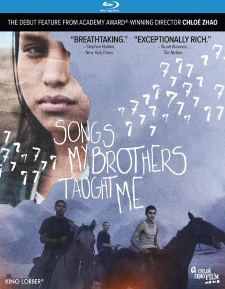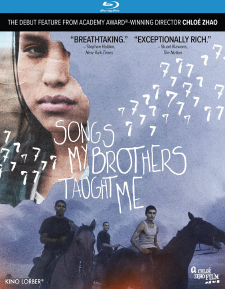Songs My Brothers Taught Me (Blu-ray Review)

Director
Chloe ZhaoRelease Date(s)
2015 (October 5, 2021)Studio(s)
Kino Lorber- Film/Program Grade: B+
- Video Grade: A-
- Audio Grade: B+
- Extras Grade: C
Review
Songs My Brothers Taught Me was the low budget 2015 debut feature from writer/director Chloe Zhao, who went on to win Oscars for producing and directing Nomadland in 2020, and then made the leap to franchise filmmaking with The Eternals in 2021. That’s a remarkable trajectory over the span of just six years, but it demonstrates her confidence as a filmmaker regardless of genre or budget.
Songs My Brothers Taught Me was filmed in semi-documentary style featuring a mix of first-time actors as well as experienced ones, shot on location at the Pine Ridge Native American Reservation. Zhao wrote thirty drafts of the script before she even started shooting, incorporating personal stories that she picked up from her cast, as well as ideas that she discovered while exploring the reservation. As a result, the film feels especially authentic—it may a work of fiction, but one which was born out of reality.
The heart and soul of Songs My Brothers Taught Me is the relationship between Johnny Winters (John Reddy) and his sister Jashaun (Jashaun St. John). They’ve both grown up with an alcoholic mother (Irene Bedard), a wayward father, and an older brother who is serving time in jail. A sudden tragedy appears to sever ties to the community, so Johnny wants to leave with his girlfriend Aurelia (Taysha Fuller), who plans to move to California. But Johnny’s ties to his home may be deeper than he understands.
The particulars of the narrative for Songs My Brothers Taught Me aren’t as important as the way that it captures the nature of existence for young people who grow up on reservations—the film is essentially a Native American version of Italian neorealism. It’s a sometimes sweet, sometimes bitter slice of life that creates characters who are completely plausible, because the actors understand what it means to live this way, and many of the stories are their own. There’s no melodrama here, just truth.
Cinematographer Joshua James Richards shot Songs My Brothers Taught Me digitally using ARRI Alexa Studio cameras with Zeiss Super Speed lenses. The film was framed at 1.85:1 for its theatrical release, though Kino Lorber’s Blu-ray opens that up to 1.78:1. There’s no information available regarding the resolution in which it was shot, or what kind of a Digital Intermediate was used, but the image is extremely sharp and detailed, especially in closeups—facial textures are especially well-defined. Grass, rocks, and other textures also show plenty of fine detail. There’s mild noise visible in the darker shots, but even that isn’t very obtrusive. The color balance looks natural, with good contrast in the daylight scenes, though contrast is flatter in the nighttime scenes, with elevated black levels and little to no shadow detail in the darkest shots. But those minor flaws are inherent to the original cinematography rather than being an issue with the transfer; this is an accurate presentation of the film as photographed.
Audio is available in English 5.1 and 2.0 DTS-HD Master Audio, with optional English SDH subtitles. The 5.1 track tends stays focused on the front channels, though there are gentle ambient effects in the surrounds such as thunder or wind blowing across the plains. The production audio can sometimes lack impact—the score by Peter Golub sounds fine, but the songs recorded on set can sound a little thin in comparison. But Songs My Brothers Taught Me is a film driven by its dialogue, and that’s always clear and intelligible.
Extras include the following, all in HD:
- Bloopers (4:01)
- Deleted Scenes: Aurelia's Brother (2:36)
- Deleted Scenes: Jashaun Dance (1:03)
- Deleted Scenes: Karl's Funeral (1:41)
- Deleted Scenes: Monkey (1:00)
- Deleted Scenes: Travis Tattoo (1:37)
- Deleted Scenes: With Angie (1:38)
- Interview with Director Chloe Zhao (11:38)
- Trailer (2:02)
Having a blooper reel for a film like Songs My Brothers Taught Me may seem a little odd, but it demonstrates the freewheeling, improvisatory nature of the production. The deleted scenes are a mixture of small moments removed from the final film, some extensions of existing scenes, and others small standalone pieces. They all provide additional texture, but none feel essential, so it’s understandable why they were cut. The interview with Zhao is the best extra on the disc, though it’s far too brief. She explains her personal feelings about the story, and how she found it interesting that young people still feel such a strong connection to the reservation despite the fact that modern technology has also connected them to the broader world. She discusses the relationship between reality and fiction in the film, and how she started by writing a fairly conventional coming-of-age story with typically “big” dramatic moments, but that didn’t fit with the ennui of reservation life that her actors had experienced. She covers the casting process, and how that informed her rewrites of the script. She also talks about how she got into filmmaking despite growing up in Beijing with little exposure to the medium—it was actually comic books that introduced her to visual storytelling, so her move to Marvel isn’t quite as unexpected as it may seem.
Songs My Brothers Taught Me didn’t attract much attention during its limited theatrical release, but it did establish Zhao as a filmmaker to watch. Some directors maintain a clinical distance, but she shows the value of using an empathetic approach instead. She cares about her characters, and successfully relates that concern to her audience. Hopefully Kino Lorber’s Blu-ray release will help the film find a wider audience.
- Stephen Bjork
(You can follow Stephen on Facebook at this link)

